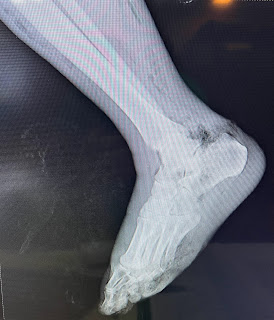Fifty-Fifty
"Only trust in God can transform
doubts into certainty,
evil into good,
night into radiant dawn."
~ Pope Francis
***
I'm enjoying a nice day off when I receive a call that I am needed at the hospital. The world just welcomed a sick newborn rapidly delivered by C-section after a failed attempt at vaginal delivery and significant drops in the baby's heart rate just before being born. After a quick process of deduction amongst a group of a visiting obstetrician, an anesthesiologist, and a general surgeon, I, as the Family Medicine physician, am first "in-line" to care for the ill newborn. I anxiously think to myself, "Where is the pediatrician or the neonatologist and the astute baby nurse?" When I arrive, the baby is breathing 80 to 100 times per minute (normal 40 to 60), so quickly he outruns the steady second-ticking clock in the room. The muscles contracting between his ribs are doing their best to help his lungs keep up with the sprint, his nostrils violently flare open to keep up with his insatiable demand for oxygen, and his head is bobbing up and down with each breath in affirmation to the obvious question, "Do you need help?" It becomes quickly apparent that this child has fallen victim either to a life-threatening infection or severe inflammation in his lungs from aspirating meconium (a baby's first poop). We do what we can with antibiotics and supporting the baby with oxygen. I am told by one of the long-term doctors here that given the degree of this baby's illness and the limited resources of our hospital, there is a fifty-fifty chance he will survive. Fifty-fifty. The chances may sound great for one trying their luck at a generous lottery ticket, but not so great when applied to the life of a human being.
It's another busy day on-call at the hospital when a patient rolls into the Emergency Room. It doesn't take long to notice the patient's right foot is not in good shape. Some infections find satisfaction in gently resting on the skin surface while other infections find their home through a deeper descent into a person's muscle and bone. And even some infections are only satisfied once they consume the tissue in which they have taken residence and progressively destroy any surrounding tissue in a trajectory of constant movement until stopped by an external force in tribute to Newtonian physics. This severe form of skin infection is called necrotizing fasciitis and is a surgical emergency because if not treated quickly, it will cause loss of one's affected limb or one's life. A full body exam shows me that the patient's heart is failing and his blood vessels are expanding in a last-ditch effort to keep up with supplying a sick body's demand for oxygen. Soon after, blood tests reveal a substantial army of white blood cells recruited to fight against the life-threatening bacteria and X-rays reveal a build up of toxic air under the patient's skin, evidence that the bacteria has no intent on giving up any time soon. The surgeon quickly takes the patient back and amputates his right leg, removing the source of his infection. I can finally breathe a sigh of relief now that antibiotics are on board the ship and the culprit thrown overboard. But then I get a call from the anesthesiologist who says the patient appears to be unresponsive. He only had regional anesthesia so it's not the effect of a concoction of sedating drugs. His blood sugar is greater than 700 (normal is less than 140 or so). We realize he is on the brink of a diabetic coma with a disease called hyperosmolar hyperglycemic state or HHS, a severe life-threatening complication of diabetes. Shortly after, his blood pressure begins to drop steadily to a level that is insufficient to oxygenate his vital organs. I think to myself, "Where are the intensivist and the skilled ICU nurse?" In the US, this patient would be in the intensive care unit receiving insulin through an IV pump with frequent sugar and electrolyte checks. We do what we can to bring his blood sugar down with injecting insulin into the skin, supporting his blood pressure with a medication that clamps down on his blood vessels, and blindly giving him electrolytes in an effort to prevent complications of the high levels of insulin. Again, I am told by one of the long-term doctors that there is at most a fifty-fifty chance he will survive. Fifty-fifty. Probability had never sounded so cruel.
***
The next couple of nights were difficult- plagued by uncertainty, anxiety, despair, inadequacy. But, a couple mornings later, my doubts turned into certainty as the night turned into radiant dawn. By God's grace, the sick baby began to breathe normally and the young man began to wake up as his sugars and blood pressures returned to normal levels.
I learned a valuable lesson in trust. I realized that though a neonatologist or intensivist would have undoubtedly been helpful, they could not reliably be present in our time of need. There is One, however, on who we can always rely in times of need, no matter the situation or the outcome- and He was there.
I also learned a valuable lesson in divine statistics. I was focused on the cruel fifty-fifty chances of this world when there is always a better probability on which to focus my attention: that God is present in every person and every situation 100% of the time. Probability can't get better than that...




I so enjoy your story telling and the inspiration it provides. Thanks for sharing!
ReplyDeleteThanks for these words, Zach.
ReplyDelete